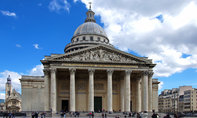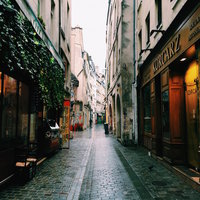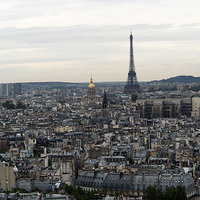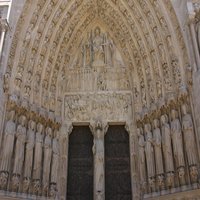- About Us
- Columns
- Letters
- Cartoons
- The Udder Limits
- Archives
- Ezy Reading Archive
- 2024 Cud Archives
- 2023 Cud Archives
- 2022 Cud Archives
- 2021 Cud Archives
- 2020 Cud Archives
- 2015-2019
- 2010-2014
- 2004-2009
 |
(Mar 2017) Short Fiction: |
Cities like dreams are made of desires and fears, even if the thread of their discourse is secret, their rules are absurd, their perspectives deceitful, and everything conceals something else
-Invisible Cities, Italo Calvino
With the overcast morning, the cavernous insides of the Pantheon in Paris held more shadows than Grace expected. She walked under the dome and looked up into the half-light. When she was little, her mother had once told her about a scientist who had hung a pendulum from it to prove the earth rotated. She imagined it as a child to be a grand experiment with important scientists in their white coats and bow ties gathered around it discussing the implications of what they saw.
But today, the grand experiment faded, and all she could see was the specter of a solitary metal ball swinging back and forth in its monotonous track bearing witness to the fact that the earth was still going in circles. She could hear it part the air in its path, and knew the displaced air simply closed in behind it ready to resist the sphere on its journey back. An exercise of futility.
Grace, now 59, had not intended her last trip to Paris to be so depressing. She knew that there would be a tinge of melancholy. She was here to say goodbye to the city and old friends. But news that the building which had housed the Clinic for Facial Prosthetics was being torn down interrupted the goodwill tour. It seemed to fill her with the same apprehension and sadness that an unplanned visit to a distant relative discovered to be terminally ill would. It was like the city itself was beginning to dictate the terms of this goodbye.
She ran the clinic from its beginning shortly after the Great War ended in 1918 until it was closed 5 years later. The clinic had provided tin masks to hide the scars or the absence of a veteran’s face.
It was now 1937. Grace was silver haired. Her face, round and marked like a chouquette she thought, showed signs of the earth’s gravitational pull. The plump had gone out of it. She was 5’8”, maybe 5’7” now, and slender. She wore a blue dress with white polka dots she bought the day before. She was told by friends that she looked good for 59, but she still felt old.
Grace disliked the Pantheon. It was an over-sized mass grave for the self-important, but the view of Paris was magnificent from its dome. Someone had taken her there on one of the first days she was in Paris; before the clinic had opened. The sky was full of sunlight and she could see forever. The view seemed infinite. It had been a moment of triumph in her life.
Paris was a dream that had run through her consciousness and was weaved into the earliest of her memories. Her father and her mother, her father’s second wife, had gone to Europe for the honeymoon, and her mother would tell her stories of their trip. She always loved the stories of Paris best; it was where fantasy and reality met for her, a fairy tale that actually existed.
Paris became the template which she placed over the world around her as she grew up. As a little girl, she would pretend the brook that ran along the backside of her family’s estate was the Seine and sit out with her pencils and paper to sketch masterpieces. When she became bored, she lost herself in the Parisian streets of her mother’s stories and the city she built out of them.
Admittedly, her ideas were simple as a little girl, a jumble of little men running around with berets painting everything they saw with a glass of wine in their other hand and highly fashionable ladies walking the Champs-Élysées going in and out of the boutiques like oddly colored bumble bees. But the dreams grew more complex and embedded in her memory as she grew older. What had started as a few buildings around the Eiffel Tower, grew and expanded in complexity. Every time her daydream crumbled from a new bit of information added, the ruin became the foundation for a new city to occupy her mind.
She would spend many hours in her life tearing down and reconstructing this city. She could bend the new information to fit. Even when she was older and started to read travel books and meet actual Parisians, what she learned about the city could not crack the veneer of the fairy tale she had built. The city was a daydream she didn’t wake from until she saw the real Paris.
The Pantheon was almost empty of other people. From outside the dome, the visibility of Paris was fair, but the sky was overcast and bleak. The clouds, formless, seemed to turn the infinite city she usually saw to a finite one surrounded by infinite fog, like looking out from a dingy snow globe emptied of its water. It was as if the city had cut itself off from the rest of the world.
The nebulous horizon was almost enough to deter her from her afternoon trip, there was something just beyond her periphery that seemed to be watching, or waiting. So much seemed to sit on the periphery, beyond the fog. So many moments in her life she remembered reaching out to touch or grasp something that was never really there.
As she descended, and stood below again under the dome, she began to hear footsteps distinct from the general pedestrian shuffle. Heavy boots seemed to approach from behind her rapidly. She turned expecting to have someone run into her, but was met with only a slight breeze and the looks of those who noticed her abrupt turn-around. The echo of the space was playing tricks on her
Bits of sunlight finally started to crack through the cloud cover by the time she was outside again. It convinced her to continue her walk; maybe the day was turning around. But she needed to fortify herself for the confrontation or whatever it was that triggered the flight reflex inside her, and chose a less direct path to the clinic.
The smell of bread wisped past, and she noticed a bakery on the other side of the street. As she crossed the avenue, steam from a vent on the front of the building wafted up to greet her. Already cooling, it stole her warmth like a parasite. The smell of fresh bread was a comfort, but it was the only thing that hinted at the warmth inside.
The display window in front of her, too opaque from condensation to see what was cooling behind it, offered a half-realized reflection of herself. Her hair looked like a stretched out tuft of cotton. She stared into its yes. The moisture on the window left tears on her other self. She lifted her hand to wipe them away, but they were on the other side of the window. Where was its sadness coming from? Why did her emotions feel so alien to her today? The crash of a pan within the bakery interrupted her self-hypnosis. The city reflected on the window had drawn her in. Even when she was physically in the real Paris, she couldn’t help but feel she was not seeing the real city; but was somehow stuck in a reflection of what was really there. She left her doppelganger in the clouded window, and began her walk in earnest. Her bones ached from the cold. It seemed like each year she had a harder time keeping warm.

She was surprised at how dirty Paris was on her first visit; after the initial awe had worn off. Her first outing had been to the Eiffel Tower and then to Notre Dame. That part met her expectations. But within a few days, her old world started to scratch through the sheen of the new one. The grime and dirt you find in any densely populated city blackened both the actual Paris and the one she perceived. There were homeless hiding in plain sight, ignored by the locals. There was trash dropped without thought by pedestrians on the street. The template she had so carefully crafted, wasn’t able to withstand the onslaught of reality. It began to skew. As hard as she tried to see the Paris kept in her mind’s eye, she could not bend the city to her will.
She started to divorce the real Paris from the city in her mind. The tension had become too much. But even still, the two seemed interdependent and intertwined in many ways. If she could not reconcile the two, must one give way? How did the city she saw in her head fit with the city she met and still meets; a city her with a not yet here or to never be?
The gray cloud cover began to move above her, but the sun’s appearance did not burn through her apprehension or the cold. It had deceived. She could not rid herself of the chill. As she walked closer to the building’s neighborhood, the streets seemed to narrow and close above her blocking out much of the intermittent light. The neighborhoods were quiet, with most of their occupants at work or in school, perhaps, but even the occasional bird’s voice seemed to be quickly consumed by silence.
It was almost a vacuum, as if the city wanted to remove all distractions from her walk to the building. With only small bursts of light escaping the westward passing clouds, the street would only give glimpses of color, as if the buildings were covered in dust cloths lifting slightly when someone walked by. But the gray-scale limestone buildings and window dressings felt appropriate today.
Grace was not so simple as to believe that Paris would not have its own problems. Like any major city, it would have poverty, greed and filth, but when she faced these things in person, they seemed to drive home how similar Paris would be to any other city, nothing extraordinary.
This conflict, things never being what she imagined, had borne down on her for as long as she could remember. What she wanted out of life, and what life gave her always seemed to contradict rather than compliment. Why was it so hard for things to fit together, a jigsaw puzzle where pieces almost fit, or sometimes fit perfectly, but refused to stay put. She wasn’t so conceited to think that her vision for life was the best thing that could happen to the world, but there were basic wishes that most agreed on, but that never seemed to materialize. Most people want everyone to have a place to lay their head, friends and good health. Yet, people still lived without shelter, and hungry and dirty children still clung to your clothing asking for bread. You still saw drunken husbands stumble home and hit their wives as a greeting. Young men still lost their faces to the greed and pettiness of world leaders.
Even as a child, she had been aware of the gap between what she perceived or others perceived, and what was. One of her early memories of connecting with her mother, beyond the stories she pried out of her was a walk in on their estate to pick and press wildflowers.
Her mother must have gotten it into her head that it was time to get involved with her daughter in some sort of arts and crafts project. She had probably read some article on child rearing that one of her friends had passed on to her, and after seeing a few of her friends starting similar projects with their children, got it into her head that it would be the motherly thing to do; a parental fad of sorts.
Looking back on it now, she realized how awkward her mother became when left alone with her, not really knowing how to treat her daugher as a child. Her mother seemed to see a helpless adult who should know better. Grace remembered her mother was surprised, or even shocked at how excited she had gotten about going for a walk with her to pick flowers.
And it was an endearing moment for them both. This wasn’t wishful remembrance on Grace’s part as her mother would talk of this memory after Grace was an adult.
“I have to admit dear, that most of the time I left your day to day care to your governess Alyce, but that little walk we had, has stayed with me. It was the rare occasion when I felt like a mother. I was anxious at first, but you were having so much fun . It turned into such a lovely afternoon. I don’t know why I was always nervous spending time with you.”
They had struck out together with the gardener. Her mother was carrying a picnic basket, and the gardener had a wood bucket containing a trowel, clippers and a few other tools. She remembered that her mother’s gardening clothes looked quite new, and that she had pouted a little when she was told to put on some old clothes for the excursion.
They walked into the garden, and started hunting flowers. They began in the the formal garden with its roses and herbaceous border filled with purple and yellow flowers, and then into the wild garden. Grace always loved the yellow daffodils scattered across this part of the garden. Her mother would point to a flower, and asked Grace if she liked it. Regardless of Grace’s answer, she would instruct the gardener to cut it. But at the end of the walk, her mother told her to find a pretty flower by herself, but not to pick it. She was to get her mother or the gardener to come and cut it. She walked through the garden paths, until she arrived at a small patch of grass with an iron bench, rusted red at its edges. She found the flower she wanted shooting up from the grass by itself, and called out to her mother.
When the mother and the gardener arrived, she pointed excitedly to it, but couldn’t help seeing confusion in her mother’s eyes.
“Gracie dear, that’s just a common daisy. I’m not even sure how it got there. Aren’t there any of the more exotic flowers from the garden you want to pick?”
“No Mother. I like this flower. It’s so pretty by itself.” Grace remembered being confused at how her mother could not see how pretty the flower was.
Her mother gave a little bit of an exasperated and puzzled look, but the gardener knelt down by the daisy. He winked at Grace and cut it as if it had been one of the most exotic and delicate flowers from the garden.
They brought the flowers in to be pressed. Grace watched impatiently as her mother and some of the servants started placing the flowers between the pages of big books, and placing a brick on top of each one. She was disappointed when she discovered the pressed flowers wouldn’t be ready right away.
When they were ready, her mother surprised her with her daisy glued on fancy paper as a bookmark and place inside a new picture book of art. She held onto the bookmark until she left for school. She had looked for it when she was home on break, but it had disappeared.
As she replayed the walk through the gardens, she noticed a shadow that seemed to be following her just beyond the outskirts of the garden they were walking in. As far as she could tell, it had never been in that memory before. She couldn’t shake the feeling that this was an emissary of the city making sure she didn’t stray too far from its purpose. What right did it have to infiltrate the safety of fond memories? The cold seemed to saturate even deeper into her body.
Part II of Wildflower will be continued in the next issue of The Cud...
